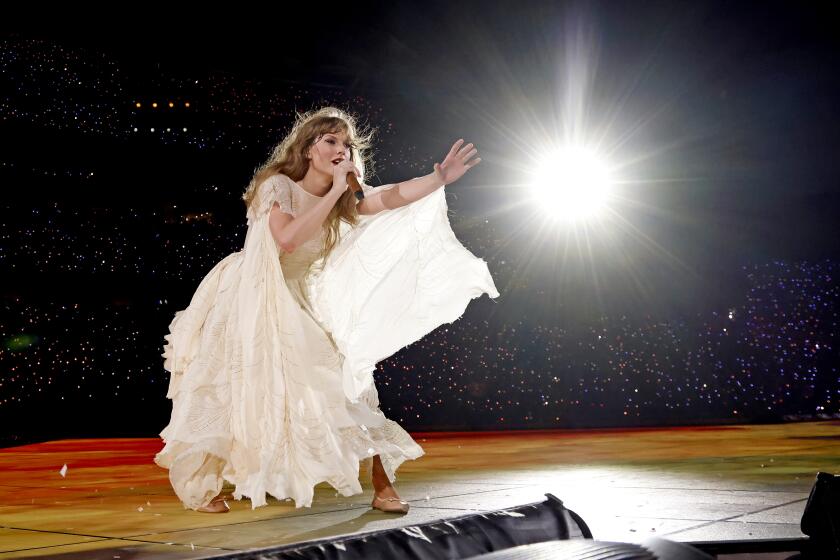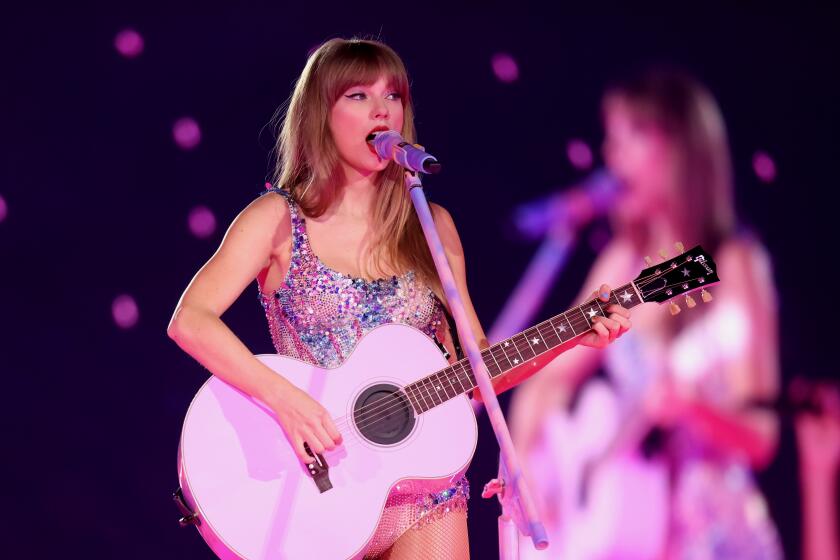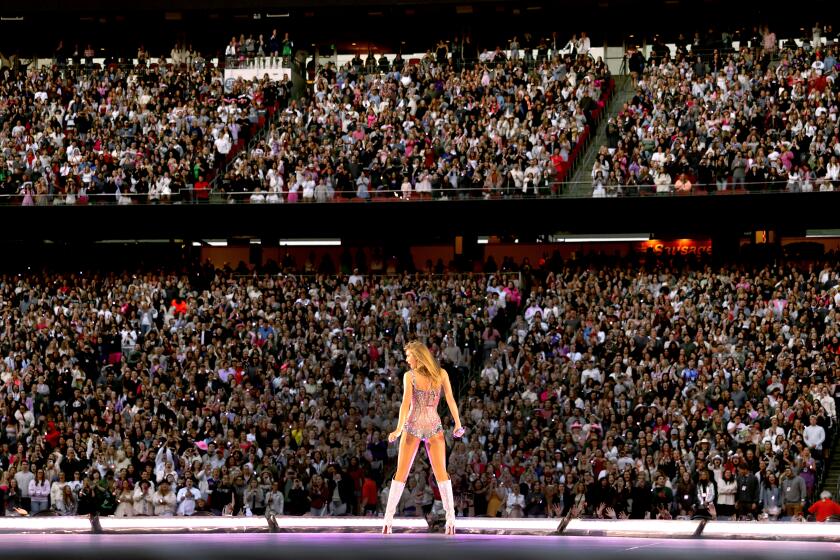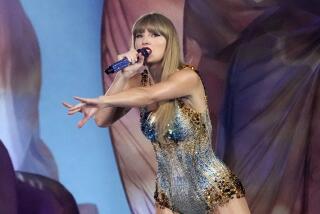It’s a love story, L.A. just says yes: How Taylormania took over the world
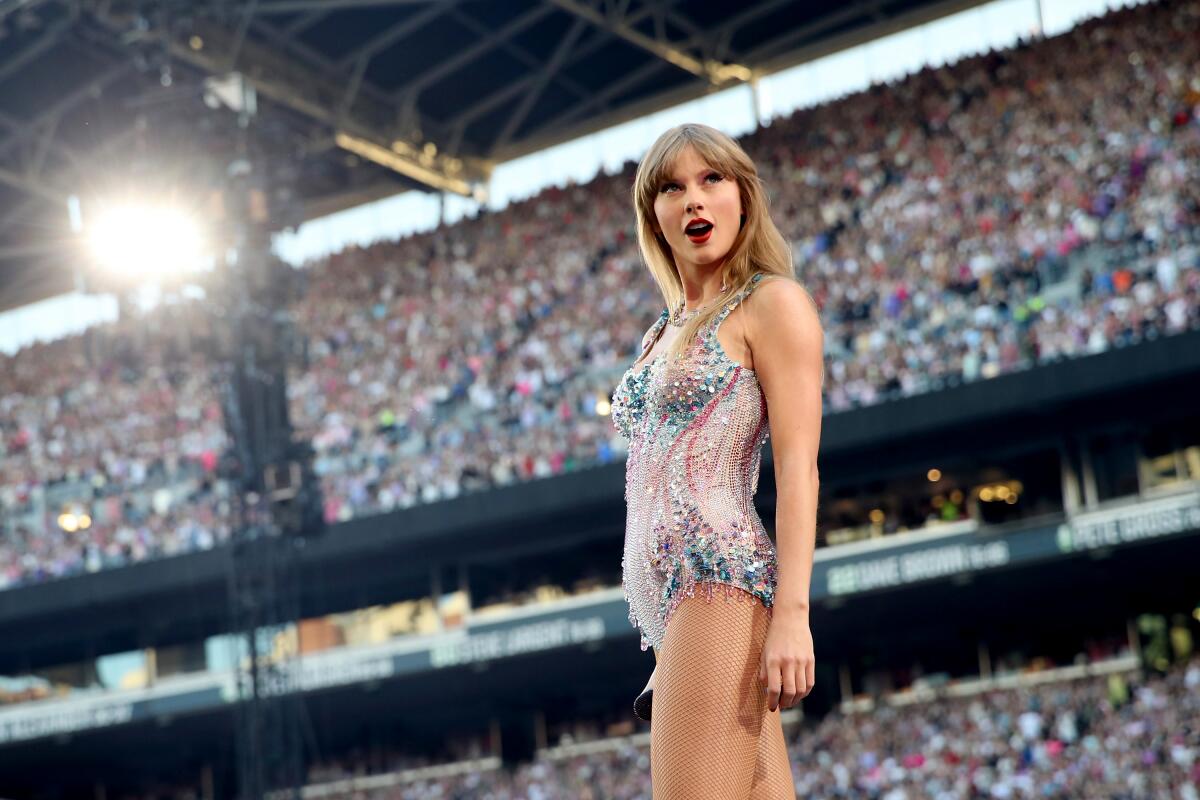
- Share via
Last year, Madeline Sabatoni scored an improbable treasure for her family: three tickets to see Taylor Swift’s blockbuster Eras tour at SoFi Stadium for $100 apiece.
“We got lucky in so many ways,” the 41-year-old from Sacramento says. “I put every single California date in the presale. There were 2,000 people ahead of me in the queue, but by the end of the day I bought the first three tickets offered. I didn’t even question where they were.”
On Aug. 8, Sabatoni, her husband and their 8-year-old daughter will be in the nosebleeds at Inglewood’s gleaming NFL palace. In lieu of an expensive hotel, they plan to stay with relatives in Pasadena, which will free up funds for the merch counter. The show will be Sabatoni’s daughter’s first-ever live concert.
“She’s definitely making friendship bracelets,” Sabatoni says — one of the many communal rituals that bond members of Swift’s gargantuan fan base. “Everyone remembers their first concert. But seeing Taylor at the height of her career, on her biggest tour? I still get anxious and check my Ticketmaster account to make sure the tickets are in there.”
The Sabatoni family are three of the nearly half a million Swifties set to make the pilgrimage to SoFi starting Thursday. For six sold-out nights — the final engagement of the tour’s first U.S. leg and its longest stay in a single city so far — Eras will turn Inglewood into the most TikTok’d place on the planet.
Parking! Public transit! Fan chants! Friendship bracelets! Everything you need to know before you see Taylor Swift at SoFi Stadium for the L.A. stops of her Eras tour.
The record-breaking road show, which launched in March and is expected to rake in more than $1 billion by the time it wraps next year, has already transformed the American concert business with its sheer scale and ravenous fan demand. When tickets went on sale in November, Ticketmaster famously crashed under the pressure of millions of would-be customers, helping to spur a congressional antitrust investigation into the ticketing platform’s parent company, Live Nation Entertainment.
And the tour has remained atop the cultural conversation virtually nonstop since then — a testament to the popularity of Swift’s music, of course, but also to the 33-year-old’s marketing savvy and her understanding of the modern digital news cycle, which she’s commandeered with unannounced celebrity guests and a nightly “surprise song” slot in her three-hour set list.
Last month, seismologists reported that Swift’s gigs at Seattle’s Lumen Field had caused the geological equivalent of a 2.3-magnitude earthquake. In San Francisco on Saturday, the Giants baseball team nodded to the singer’s stop in nearby Santa Clara by having players swap their usual walk-up songs for Swift tunes. For brands eager to look with-it this summer, Swift probably trails only the smash “Barbie” movie as a pop-culture touchpoint.
Here in Los Angeles — amid grueling Hollywood writers’ and actors’ strikes that shut down the city’s flagship industry and a hotel workers’ strike that may affect visitors — the Eras tour represents a welcome jolt for a battered local economy, with experts estimating that the weeklong run of SoFi dates (Aug. 3, 4, 5, 7, 8 and 9) could bring as much as $150 million of spending to the area.
“The Federal Reserve noted that cities that host a Taylor Swift concert show a substantial increase in revenue in hotels and restaurants,” says Lee Ohanian, an economics professor at UCLA. “I’ve never seen them do that before.”
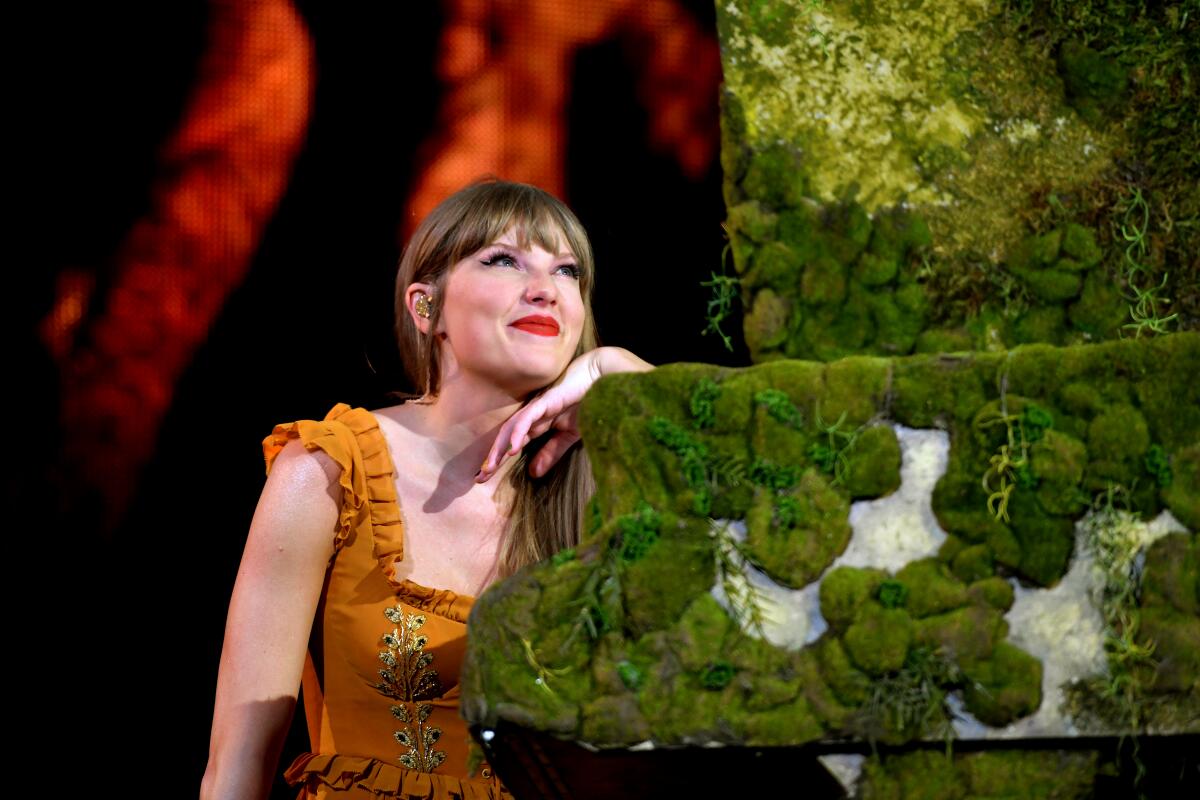
How to explain this degree of Taylormania?
“It’s very simple as far as I’m concerned,” says Monte Lipman, chief executive of Swift’s label, Republic Records. “Taylor is the consummate storyteller and songwriter.” Lipman points to the “honesty and authenticity of her songs” and identifies “a bedrock of trust, respect and loyalty” as the basis of Swift’s relationship with her audience, which he says “goes way beyond any one genre of music or community.”
Adds the exec, whose company also counts Drake, the Weeknd, Post Malone and Morgan Wallen among its acts: “Taylor’s level of domination across every facet of our business is unprecedented.”
Bill Werde is inclined to agree. Director of the Bandier Program for Music and the Entertainment Industries at Syracuse University and a former editor of Billboard, Werde notes that Swift is on the road playing the biggest shows of her career behind the release of one of the biggest albums of her career in last year’s “Midnights” — a rarity in an age when legacy acts can fill stadiums yet struggle to connect with new music, and when emerging superstars can rack up billions of streams without establishing a top-tier live business.
“It’s unique in the streaming era,” he says of Swift’s success, which last week saw four of her albums inside the top 10 of the Billboard 200: “Midnights,” 2019’s “Lover,” 2020’s “Folklore” and her rerecording of 2010’s “Speak Now,” which entered the chart at No. 1. Swift was the first woman in history — and just the third artist overall — to chart four albums that high at the same time.
Last year, the Puerto Rican singer and rapper Bad Bunny toured stadiums (including two sold-out nights at SoFi) in the wake of “Un Verano Sin Ti,” which finished 2022 as the year’s most-consumed LP. “But with Bad Bunny you’re talking about the new hotness, not someone who’s on their 10th studio album,” Werde says.
“I mean, the last artist who could effortlessly sell out stadiums and was simultaneously on top of their game in terms of the zeitgeist of popular music — the name that comes to my mind is Michael Jackson,” he says. “This is really like the ‘Thriller’ era.”
On Friday, at the kickoff of her Eras tour, Swift performed a whopping 44 songs from all 10 of her studio albums, parceled out in distinct chapters.
Even Swift’s admirers probably would’ve had a hard time believing in 2006 that she’d go on to make the kind of creative pivots she has while only expanding her cultural footprint. She broke out back then as a teenage country-music prodigy writing vividly about romance and heartbreak; “Fearless,” her 2008 sophomore LP, won a Grammy Award for album of the year and set her up to move into pop with 2012’s “Red” and 2014’s “1989,” the latter of which earned her a second album of the year Grammy.
Yet as her music grew slicker — and her closely scrutinized romantic life ever more celeb-studded — Swift’s most devoted fans continued to perceive her as the unflinching diarist they’d discovered as kids.
“To have grown up watching Taylor tell the truth in her songwriting really allowed me to crave the same kind of honesty in mine,” says Gracie Abrams, the 23-year-old L.A.-based singer and songwriter who’s on the Eras tour as one of Swift’s opening acts. (Among the other openers at SoFi will be the L.A. sister trio Haim.)
Asked when she first encountered Swift’s music, Abrams — who drafted one of Swift’s frequent collaborators, Aaron Dessner, to produce her recent “Good Riddance” album — says, “I wish I could pinpoint an earliest memory, but the truth is that I don’t remember a time in my life where Taylor wasn’t the immediate go-to inevitable soundtrack. She has scored every formative memory I have.”
Swift last toured in support of 2017’s “Reputation”; the COVID pandemic scotched plans to hit the road behind “Lover,” though the singer used her time at home as fruitfully as anyone in music: In 2020 she secretly recorded a pair of folky quarantine LPs in “Folklore” and “Evermore” — a third album of the year Grammy for “Folklore” brought her even with Frank Sinatra, Stevie Wonder and Paul Simon in that esteemed category — then in 2021 she launched her campaign to remake her first six albums after her old label, Big Machine, changed hands and she lost control of the rights to her master recordings.
Known as “Taylor’s Versions,” the remakes (each loaded with outtakes not included on the originals) have been enormously successful. “Speak Now (Taylor’s Version),” which came out July 7, scored the biggest opening of any album released so far this year, moving the sales-and-streaming equivalent of 716,000 copies in its first week of availability.
Without much hyperbole, Republic’s Lipman says the re-recording project has “created a frenzy amongst loyal supporters” and calls it “nothing short of a cultural phenomenon.”
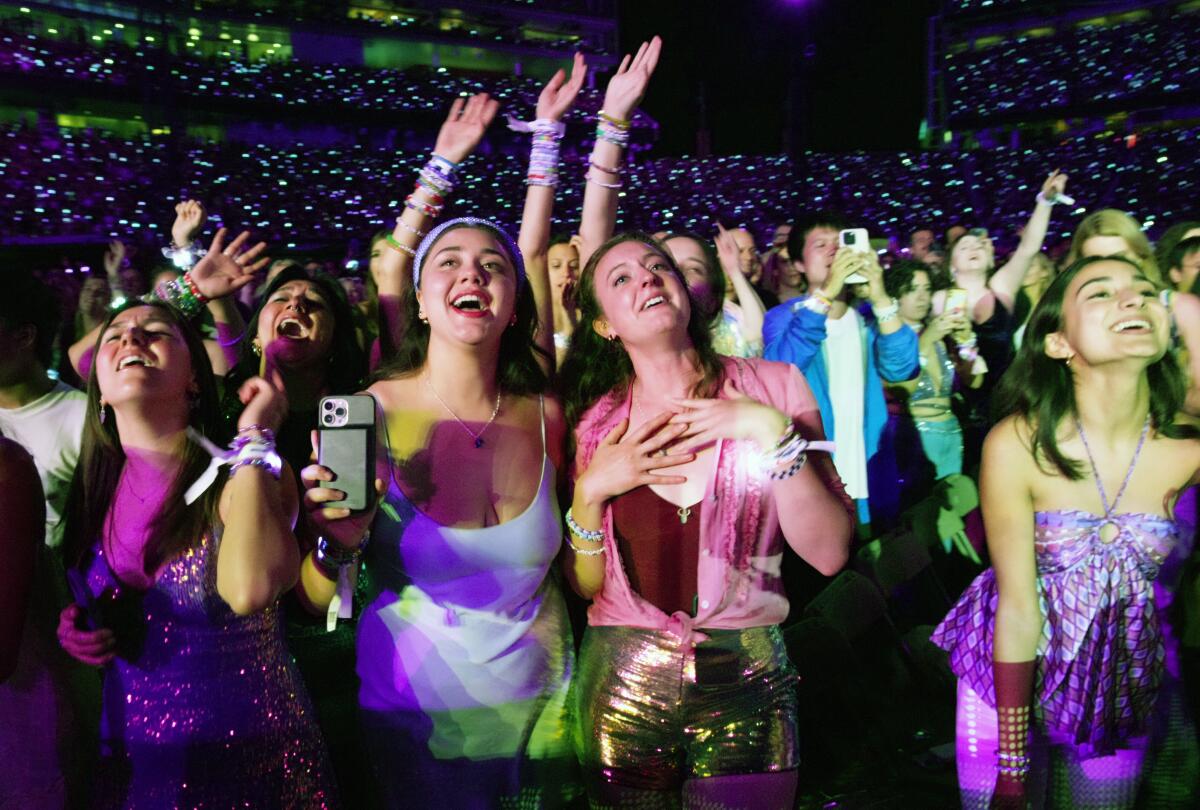
It’s also kept interest in the Eras tour exceedingly high. The show’s concept is straightforward — “We’re gonna be exploring the last 17 years of music that I’ve been lucky enough to make and you’ve been kind enough to care about,” as she put it onstage during opening night in Arizona — yet the execution is elaborate, with more than three dozen songs parceled out in distinct chapters, each with its own costumes and color scheme.
Along with the surprise songs and unannounced cameos — the rapper Ice Spice appeared at New Jersey’s MetLife Stadium, while the actor (and onetime Swift boyfriend) Taylor Lautner dropped into a show in Kansas City — Swift juices the show’s presence on social media with regular bits like an oft-TikTok’d moment in which she bestows a signature hat on an audience member during her song “22.”
The path to the Eras tour wasn’t free of trouble. Ticketmaster’s botched sales rollout left many fans out in the cold while resellers flipped tickets for thousands of dollars above face value. Opening-night tickets first retailed for $49 to $449; now you can expect to pay between $800 and an eye-watering $11,000.
Swift said the debacle was comparable to surviving “several bear attacks,” while Live Nation’s president, Joe Berchtold, was hauled before the Senate Judiciary Committee to explain the company’s tech meltdown.
Yet the hassle seems to have stopped few from doing whatever it takes to be in the room with Swift.
“These kinds of concerts are not a new phenomenon, but what’s changed is the ticket price,” says Sanjay Sharma, a finance professor at USC’s Marshall School of Business. “But privileged people in this new generation are spending on live events. Coming out of the COVID era, there’s pent-up demand for things that are once in a lifetime, with no price point too high.”
Being at SoFi in the flesh yields intangible benefits too. “If you go to the Taylor Swift concert, on Instagram you’re now a celebrity in your own right, and you’re paying for that,” Sharma says. “Even if you just get to say, ‘Oh, my daughter went to see Taylor Swift,’ some of Taylor’s celebrity is rubbing off on you.”
Around Inglewood, hotels are booked solid for the duration of Swift’s six-night stand. Scott Blakeslee, the L.A.-area manager for the upscale Sonder hotel brand, says the majority of bookings for the Sonder Lüm hotel, which opened in 2021 in anticipation of SoFi’s crowds, happened three months ago.
According to the travel platform Kayak, searches for L.A. hotel rooms during Swift’s SoFi run are up 38% compared to the same dates last year; room prices are up 16%, Kayak says, to an average of $302 a night.
Expecting a crush of traffic, Metro announced expanded public transit services specifically to accommodate Swift’s shows, running late night service and dedicated shuttles from the C and K rail lines to SoFi.
Not a lover of $100 parking spaces? There are plenty of ways to get to Taylor Swift’s concerts at SoFi Stadium by train or bus.
The Eras tour also arrives amid a labor fight about how L.A.’s entertainment largesse is shared. “For hotels, the so-called Swift Lift will result in unprecedented profits,” says Kurt Petersen, co-president of Unite Here Local 11, which represents striking hotel staff who recently protested at the Hyatt Regency LAX to get Swift’s attention. “Meanwhile, hotel workers who are a paycheck away from being unhoused will see none of this windfall.”
Still, Adam Burke, president of the Los Angeles Tourism & Convention Board, says that traveling fans will spend an average of $1,300 on tickets, food, outfits and other goods while in town for the tour. “We’ve seen the same thing with other major concerts like BTS and sporting events like Super Bowl LVI,” he says. “Tourism from these types of events is an important, ongoing part of our local economy.”
Adds USC’s Sharma: “If I have a local shop around SoFi, I might do 50% of my annual revenue just around concerts. That’s not much of a difference to Ticketmaster, but it’s a lot for smaller shops around the stadium.”
This sort of lavish concert spending is unprecedented coming from such a young audience, says UCLA’s Ohanian.
“It’s not unusual for a 60-year-old to spend that kind of money on Elton John or the Rolling Stones,” Ohanian says. “But it is unusual for a 30ish crowd supporting a family. I’ve never seen anything like that before in that age range.”
Abrams, for one, isn’t surprised by the lengths fans are going to.
“The community of people who live and breathe for the music Taylor has created is so vibrant and so beautiful,” she says. “To be up on her stage with a view of their costumes and their feelings, their laughter and their tears — it’s real, pure joy in these stadiums.”
More to Read
The biggest entertainment stories
Get our big stories about Hollywood, film, television, music, arts, culture and more right in your inbox as soon as they publish.
You may occasionally receive promotional content from the Los Angeles Times.
